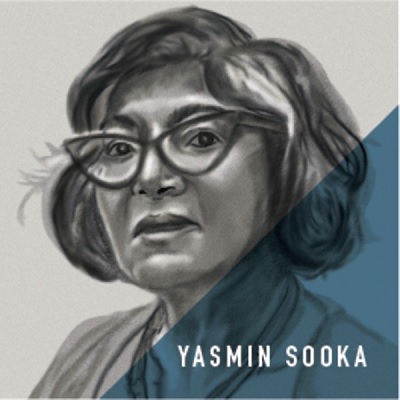In her statement to the Human Rights Council, the UN High Commissioner for Human Rights, Michelle Bachelet, has rightly called for renewed attention on Sri Lanka, citing developments that form “a very negative trend”. However, the human rights situation under the new Rajapaksa government in Sri Lanka is a lot more worrying than the High Commissioner can elaborate on in such a brief statement.
 “Member states in the global north still seem to think it’s business as usual with Sri Lanka despite the erosion of human rights and the imposition of a majoritarian ethnic and religious state,” said the ITJP’s Executive Director, Yasmin Sooka. “The international community needs to heed the call by the High Commissioner for renewed attention on the human rights situation in Sri Lanka.”
“Member states in the global north still seem to think it’s business as usual with Sri Lanka despite the erosion of human rights and the imposition of a majoritarian ethnic and religious state,” said the ITJP’s Executive Director, Yasmin Sooka. “The international community needs to heed the call by the High Commissioner for renewed attention on the human rights situation in Sri Lanka.”
The High Commissioner’s statement critically raises the recent appointment to key government jobs of senior military officials allegedly involved in war crimes and crimes against humanity. These include the Secretary of Defence, Kamal Gunaratne, whose role in the 2009 war is highlighted in the report of the UN OHCHR investigation into Sri Lanka (OISL) which has been elaborated on by the ITJP based in part on the Sri Lankan army’s own situation reports.
It is also worth reiterating that the Commander of the Sri Lankan Army, who is also the Acting Chief of Defence Staff, Shavendra Silva, was designated in 2019 by the United States government due to credible information of his involvement, through command responsibility, in gross violations of human rights, namely extrajudicial killings. He remains in office and has been put in charge of managing the country’s COVID response.
“Diplomats in Colombo routinely meet Lt. Gen. Silva, even exchanging gifts, under the rubric of “humanitarian disaster relief”. They need to be put on notice about the people they are shaking hands with and sharing photo opportunities with, all of which leaves victims feeling more insecure and unprotected than ever,” said Ms. Sooka.
In addition, former military officers have been appointed as the foreign secretary, health secretary, agriculture secretary, Chief of Staff to the President, not to mention in several of the Presidential Task Forces.
The militarisation of the bureaucracy is only one concern. Perhaps equally worrying is that nearly a quarter of the cabinet ministers are alleged by Sri Lankan media either to have been recently investigated for / or to have court cases pending against them for alleged corruption, assault or murder. In addition, administrators and key advisors have been appointed despite past allegations of involvement in corruption and in one case a conviction.
Those investigated under the last government have suggested they were the victims of a process of political victimisation and some complained to a Presidential Commission. It is important for those investigated and indicted under the previous government, that these allegations are tested in court in a process that’s seen to be fair and transparent. Until that has happened, these individuals should not be included in key parliamentary oversight roles or bodies that recommend or scrutinise other appointments. Furthermore, those who have been convicted should not be serving in public office. It is astonishing that one MP from the President’s party who is on death row after being convicted for murder was even allowed to attend parliament.
Also at issue is the concentration of power in the hands of one family: President Gotabaya Rajapaksa (Defence), Prime Minister Mahinda Rajapaksa (who controls three key ministries including Finance), Namal Rajapaksa (Youth and Sports Minister), Chamal Rajapaksa (Irrigation Minister and State Minister of Internal Security, Home Affairs and Disaster Management); his son Shasheendra Rajapaksa (a state minister). Within these ministers’ responsibilities are also at least 118 Departments, Statutory Institutions and Public Corporations all under the control of one family.
On top of this, is the creation of Presidential Task Forces that appear to bypass parliament and have vaguely drafted but potentially sweeping powers. A recent gazette notification stated that the new Government ministries had been ordered to “coordinate and implement activities in relation to subject areas of all Ministries” with the Task Forces. No explanation was given for why an additional layer of government was needed, which answers only to the President.
The UN High Commissioner also spoke of “the surveillance and intimidation of victims, their families, human rights defenders, journalists and lawyers” in Sri Lanka, which is extremely worrying as it inhibits the ongoing monitoring of the human rights situation there.
“With the space for civil society working on human rights and transitional justice closing down almost entirely, engagement by member states with the Sri Lankan Government must be on the basis of protecting human rights and human rights defenders and ensuring that Sri Lanka is held accountable to the commitments it made in 2015 to its citizens and in accordance with their international obligations. Failing to do so deepens impunity in Sri Lanka and erodes any notion of the rule of law,” commented Ms. Sooka. (By ITJP)
(This article was published in Fortnightly Magazine 'Abel', December 20, 2020)
You can send your articles to This email address is being protected from spambots. You need JavaScript enabled to view it.

